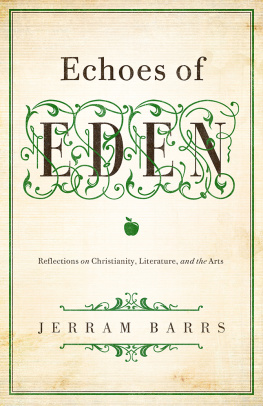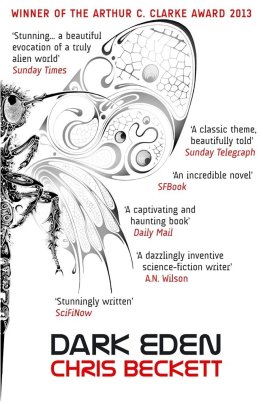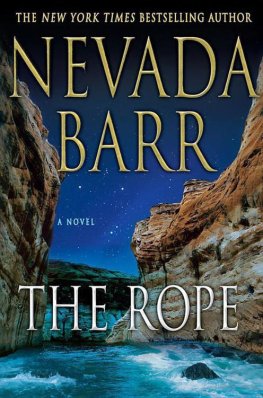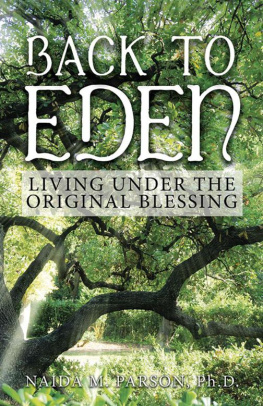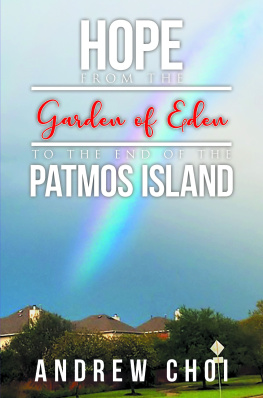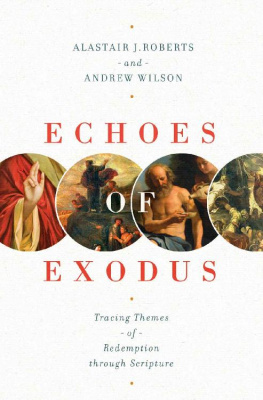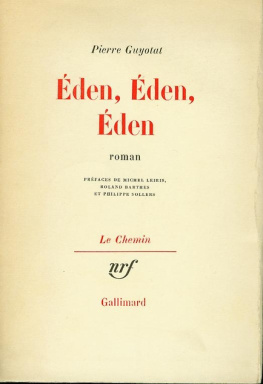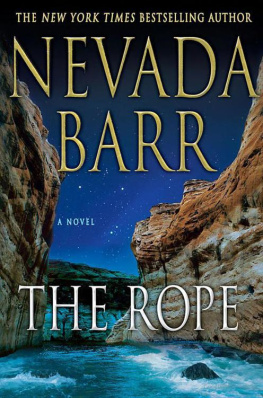Thank you for downloading this Crossway book.
Sign-up for the Crossway Newsletter for updates on special offers, new resources, and exciting global ministry initiatives:
Crossway Newsletter
Or, if you prefer, we would love to connect with you online:
Facebook
Twitter
Google +
Echoes of Eden is the most accessible, readable, and yet theologically robust work on Christianity and the arts that you will be able to find. It is biblical, theologically sound, filled with examples, and edifying. It anticipates and answers well all the most common questions that evangelical people ask about the arts. I highly recommend it.
Tim Keller, Pastor, Redeemer Presbyterian Church, New York City; author, The Reason for God
Jerram Barrs clearly loves the Christian vision of being human, and he loves human beings of all sorts. In this book he helps us to enjoy the fundamentally human activity of the arts, showing us how all great art contains elements of the true story: the story of the good creation, the fallen world, and the longing for redemption. The chapters giving us a tour of great Christian writersLewis, Tolkien, Rowling, Shakespeare, and Austenbubble over with passionate delight in these authors artistic and moral achievements.
C. John Collins, Professor of Old Testament, Covenant Theological Seminary; author, Did Adam and Eve Really Exist?
A beautiful book on the contours of beauty by a beautiful man. Jerram Barrs here presents a lifetime of meditations on a subject close to his heart. The arts, he argues, are not a luxury, nor are they the savior. Instead they are an integral part of human life because they provide a unique window onto divine truth and the truth of the divine. The chapter on how to judge the arts is alone worth the price of admission. Reading these pages one can tell that art is not the subject for Jerram, but a rich palette, one he has lived with over the years. The arts, in his assessment, tell us not only what has been lost after Eden, but also how we may return to that gorgeous land. This book will enrich both professional artists and anyone else sensitive to the power of the arts for all of life.
William Edgar, Professor of Apologetics, Westminster Theological Seminary, Philadelphia; author, Schaeffer on the Christian Life
One of the obvious virtues of this book is its balance between theory and literary criticism of specific authors. The first five chapters are a carefully constructed Christian aesthetic. The second half of the book applies the theory to five authors. The splendid organization of the book makes it easy to read, and there is an admirable range in the subjects covered, as the five theoretic chapters systematically discuss the questions that Christians really ask about the arts, while the addition of Shakespeare and Jane Austen to Christian fantasy writers provides a pleasing scope. Finally, the book has a latent apologetic angle that I liked, not only in the theoretic chapters with their defense of the arts, but also in the chapters on specific authors, as Barrs explains why he is an enthusiast for each of them.
Leland Ryken, Professor of English, Wheaton College
This is a wonderful book, especially for those who want to enhance their knowledge of how the church should view the arts. Jerram Barrs brings an intellectually informed and profoundly pastoral approach to confront the misunderstanding and animosity that frequently exist between evangelical Christians and popular contemporary literature such as the Harry Potter series. This book is a must read for anyone who has a burden to see the creation as it is reflected in todays pop culture.
Mike Higgins, Dean of Students, Covenant Theological Seminary
Jerram Barrs offers a compelling Christian defense of the imagination as a vehicle of truth and of the need to reclaim an imitative (as opposed to a self-expressive) view of the arts. He not only quotes C. S. Lewis wisely, but has written a book of which Lewis would have approved.
Louis Markos, Professor in English, Scholar in Residence, and Robert H. Ray Chair in Humanities, Houston Baptist University; author, Restoring Beauty: The Good, the True, and the Beautiful in the Writings of C. S. Lewis
For as long as I have known him, Jerram Barrs has passionately loved the arts. In Echoes of Eden he lets us share his passion by allowing us a glimpse of the beauty, truth, and grace he sees in the imaginative work of C. S. Lewis, J. R. R. Tolkien, J. K. Rowling, William Shakespeare, and Jane Austen. If he stopped there, this would be a book worth reading, but he digs far deeper, framing our understanding of the arts within the biblical worldview. From that perspective, human creativity is a good gift of God in a broken world, an expression of the image of the Creator in which we are made. Because of the brokenness, Barrs outlines eleven broad categories by which to judge a piece of art, since Gods image is always portrayed in ways that are flawed and incomplete. I hope Echoes of Eden is read and discussed widely by Christians. The truth of its message can help nurture a Christian imagination, restore the arts to their proper place in the church, and help us frame the unchanging gospel in a way that will cause a postmodern world to consider its claims.
Denis D. Haack, Director, Ransom Fellowship; Visiting Instructor, Covenant Theological Seminary
This is a marvelous book for Christians who wish to think well and biblically about culture. Professor Barrss thesisthat human cultural production always has its genesis in something I have for years called the Edenic memoryis spot-on. By providing a careful theological analysis of the origins of culture, the book teaches us how to live wisely and rightly in a world overflowing with cultural artifacts. Barrss observation on the nature and role of fantasy in the Harry Potter chapter is particularly thoughtful, and his chapter on how we are to judge the arts is as fine as anything Ive read on the subject.
Grant Horner, Associate Professor of Renaissance and Reformation, The Masters College; author, Meaning at the Movies
Evangelical Christianity has long been conflicted over the arts and in particular the literary artistry of such lights as Austen, Tolkien, and Rowling. Some justify such literature only insofar as it functions as an elaborately coded gospel tract. Others, despairing of any Christian rationale, confess such writings to be a distraction, a guilty pleasure, or even satanic. Now, with his typical blend of profundity and lucidity, Jerram Barrs clears away the clutter of much-touted but ultimately muddled arguments and sets forth a clear framework for any Christians interested in thinking biblically about art, not least those Christians who like to spend time in such places as Hogwarts or Middle-earth. Turn the page and prepare to worship!
Nicholas Perrin, Dean, Wheaton College Graduate School
In a clear and attractive style, Jerram Barrs writes with passion about the echoes of Eden in the arts, which are so central to our humanity, whatever our beliefs. Graciously and with wisdom, he picks up a conversation that has already included such Christian thinkers as John Calvin, Dorothy L. Sayers, J. R. R. Tolkien, and C. S. Lewis. Illustrations that he draws from the fiction of Lewis, Tolkien, J. K. Rowling, the still enormously popular Jane Austen, and others make even more vivid his insightful reflections. Reading his gift of a book is an enriching and inspiring experience not to be missed.

